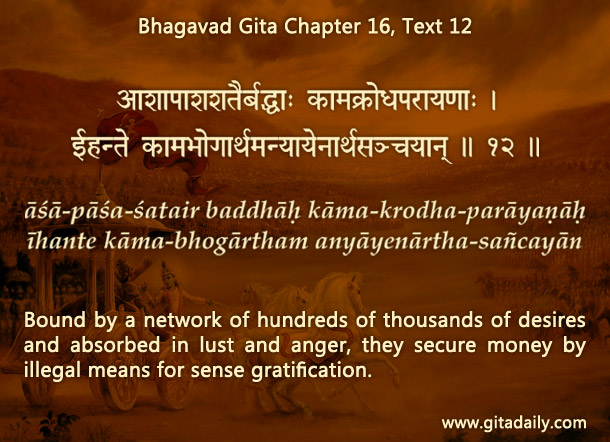Today’s ethos exalts freedom as the supreme virtue. Anything that infringes on freedom is labeled dictatorial and unacceptable.
But consider addicts. They do have the freedom to choose whether to indulge in their addiction or not, but they have that freedom only in theory. In practice, they are impelled so forcefully by their conditionings to indulge in it that it’s almost as if they don’t have any freedom. With every indulgence, their addiction worsens; thus, by exercising their freedom, they become more and more bound. Is that really freedom?
Cautioning about such a predicament, the Bhagavad-gita (16.12) indicates that our desires can become like shackles that impel us to imprudent or even immoral actions.
Consider advertisements targeted at very small children. Such ads are banned in many countries because children are considered not mature enough to be able to discern which ads depict reality and which don’t. The banning of such ads illustrate the principle that freedom needs to be balanced with the wisdom to use it properly.
Any proposal for regulating freedom often leads to vehement protests that point to the many autocrats throughout history, who claimed that they knew better than their subjects what was good for them, took away people’s freedom, and became atrociously exploitative. Significantly however, such examples indirectly illustrate the same principle: even among well-intentioned leaders, the freedom to exercise power without the wisdom to use it well is harmful.
Gita wisdom asks us to focus first on education and elevation of our consciousness so as to understand what real freedom is and how to best use it. When we voluntarily subordinate ourselves to scripturally-prescribed guidelines that educate and elevate our consciousness, we become spiritually mature and learn from within through divine guidance how to use freedom for our lasting good.
To know more about this verse, please click on the image
Explanation of article:
Podcast:


Not all of us have the capacity to make correct choices when given the freedom to do so.Our conditioning clearly impels us to make certain choices simply because it feels good for us!…even though not good for us!
Glued with mobiles and tablets surfing unnecessary sites,the younger generation may not know the value of free time as they have got full freedom to useit